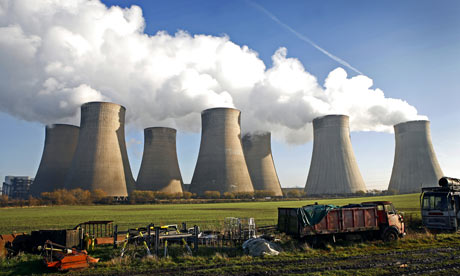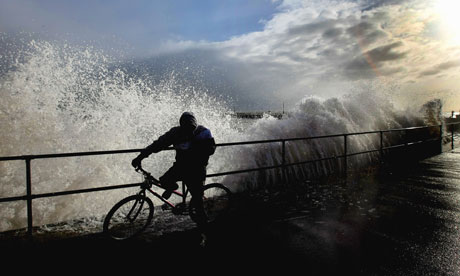
“We accept the science,” says Climate Change Issues Minister Nick Smith in a Brian Fallow article in the NZ Herald. But what does it mean for a politician to accept the science? For Caroline Lucas (left), leader of the Green Party in the UK and the sole Green MP in the House of Commons, it means taking some lessons from the World War II era. She calls for this in an article in the Telegraph.
“Our health and security, our society and way of life, our natural environment, even our coastline, are all at risk from uncontrolled natural forces – disease, drought, flood and storm. In terms of the human and financial cost in the UK and internationally, the impact over the coming decades has been compared to the world wars of the twentieth century.
“Since the 1980s, successive governments and their expert advisers have accepted the seriousness of the threat, and have known what actions are needed to avert it as far as possible and to prepare for the consequences. But they have not acted either to prepare the UK or to build an international agreement on reduction. And with every passing year, the threat to our country becomes more severe.”
At this point she turns back to the 1930s when many politicians of all parties ignored the threat of war brewing in Europe and failed to take steps to deter aggression or prepare defence.
“At the time, the two main excuses put forward to justify inaction and appeasement were that there was not enough money to pay for proper defences, and that the British public would not support a government that took tough measures.”
Rather familiar sounding, those excuses. Lucas continues:
“Yet by the end of the 1930s, public opinion was far ahead of Chamberlain’s government in demanding tough measures, and the costs of the war itself ultimately far outweighed the costs of the measures that might have prevented it. And during the war itself, the British people were willing to make the sacrifices needed to deal with the horror of Nazism and to try and build a fairer society for the future.”
She points to some of the same patterns becoming apparent today in relation to climate change. Some members of the public, some enlightened local government bodies, some firms, and many institutions and campaigning groups are ready to urge action.
“One of the lessons of history is that putting off difficult issues has a habit of making them far more costly to deal with in the long run: climate change is certainly in that category. Our aim is to help forge the national consensus that will support this or future governments in sustained, radical action.”
Lucas is far from the first on the climate change issue to draw parallels between the challenges today and those of the 1930s, but she does so unhesitatingly because she accepts the science.
Meanwhile back in New Zealand two recent articles in the Herald provided rather disparate examples of what it might mean to our politicians to accept the science. One announced Len Brown’s plans to ‘green’ Auckland. They include a goal of cutting Auckland’s carbon emissions by 40 per cent by 2025. It’s aspiration at this point, but it’s way ahead of the government target of between 10 and 20 per cent by 2020, and it’s approaching the level that might put developed societies on track to achieve the much higher reductions that will be needed by 2050 if we are to stand any chance of avoiding dangerous warming. And it places Auckland among those enlightened local bodies which are pushing ahead of their central governments in various parts of the world.
It’s a rather different picture with Nick Smith, as portrayed in a Herald article by Brian Fallow writing about the key questions for the statutory review of the Emissions Trading Scheme (ETS) over the coming months. Yes, Smith affirms the government accepts the science. And let me acknowledge that that is a welcome affirmation. Accepting the science is an advance on the vacillation which was apparent in the National party in opposition not so many years ago. It means we don’t have to traverse the dreary wastes of denial which still have to be faced in parts of the US legislature and are still basic to the NZ government’s coalition partner, the ACT party.
However, accepting the science doesn’t seem to carry with it the imperative of decisive action. Fallow’s article portrays the Minister as cautious. He says the government wants to reduce emissions (though gives no indication as to how much), that they want to do it efficiently and with fairness between different sectors of the economy, and that they have an overall objective of New Zealand doing its fair share on climate change. Arriving at a fair share? Well, Smith points out, we are the 11th highest per capita emitters globally, but on the other hand we’re in the bottom third of the OECD and we have an emissions profile that is unusual for a developed country in that nearly half of it arises from the bodily functions of livestock, while the electricity sector is predominantly renewable already. No prizes for guessing that our estimation of a fair share won’t be setting any international standards for aspiration.
Indeed Smith wants to continue to signal that a National-led Government “will not be including agriculture [in the ETS] unless there are practical technologies that farmers can employ to reduce their emissions and there has been significantly greater progress than we have seen to date by our key trading partners in pricing emissions”.
Smith allows himself some optimism when it comes to electricity generation and forestry. He points to a substantial increase in the level of renewables in energy built since the passing of the ETS and also to an increase in forestry, “one of the cheapest ways of meeting current and any future international obligations”. But there is no suggestion that the government is looking to any more than the 10 to 20 per cent target for reduction in emissions by 2020 and 50 per cent by 2050 that they have so far adopted. And even those targets have a provisional air to them. What we do will depend on what others do.
We accept the science, says Smith. The science says that if emissions are not drastically reduced in the course of the next few decades the world will consequently experience sea level rise to heights horrifying to even contemplate. Droughts and floods will afflict us ever more strongly. Food supplies will be drastically threatened. And much more. Admittedly New Zealand appears likely to be one of the least affected countries, but that will be small comfort in a world so upturned.
That’s the message the government should be giving the country, and accompanying it with measures commensurate with the threat. Along the way they might show some confidence in the capacity of New Zealanders to manage a successful green economy. Accepting the science doesn’t mean the destruction of the economy, just its reshaping.
[Eno]
Like this:
Like Loading...
 The defence of the Ratcliffe coal power plant protesters in the UK, charged with conspiracy to commit aggravated trespass, was that they were acting through “necessity” to prevent death and serious injury caused by carbon dioxide emissions and climate change. James Hansen was among the defence witnesses, testifying to the reality of the danger from climate change. The prosecution argued that the defendants were not really intending to stop carbon emissions, but instead engaged in a publicity stunt. I wrote in this post in January of the lenient sentencing from a judge who was clearly impressed by the motivation of these “decent men and women with a genuine concern for others”. They were found guilty and had to be punished, albeit leniently.
The defence of the Ratcliffe coal power plant protesters in the UK, charged with conspiracy to commit aggravated trespass, was that they were acting through “necessity” to prevent death and serious injury caused by carbon dioxide emissions and climate change. James Hansen was among the defence witnesses, testifying to the reality of the danger from climate change. The prosecution argued that the defendants were not really intending to stop carbon emissions, but instead engaged in a publicity stunt. I wrote in this post in January of the lenient sentencing from a judge who was clearly impressed by the motivation of these “decent men and women with a genuine concern for others”. They were found guilty and had to be punished, albeit leniently.
 A recent Rowntree Foundation
A recent Rowntree Foundation  No doubt the New Zealand climate change minister will point out that the New Zealand’s emissions profile is different from that of the EU and that the exchanges about reduction targets that have been taking place in Europe in recent days therefore have little relevance for us. Nevertheless I have taken heart from reading about them in their own right, whether they have relevance to us or not, though I think they do have at least some.
No doubt the New Zealand climate change minister will point out that the New Zealand’s emissions profile is different from that of the EU and that the exchanges about reduction targets that have been taking place in Europe in recent days therefore have little relevance for us. Nevertheless I have taken heart from reading about them in their own right, whether they have relevance to us or not, though I think they do have at least some.